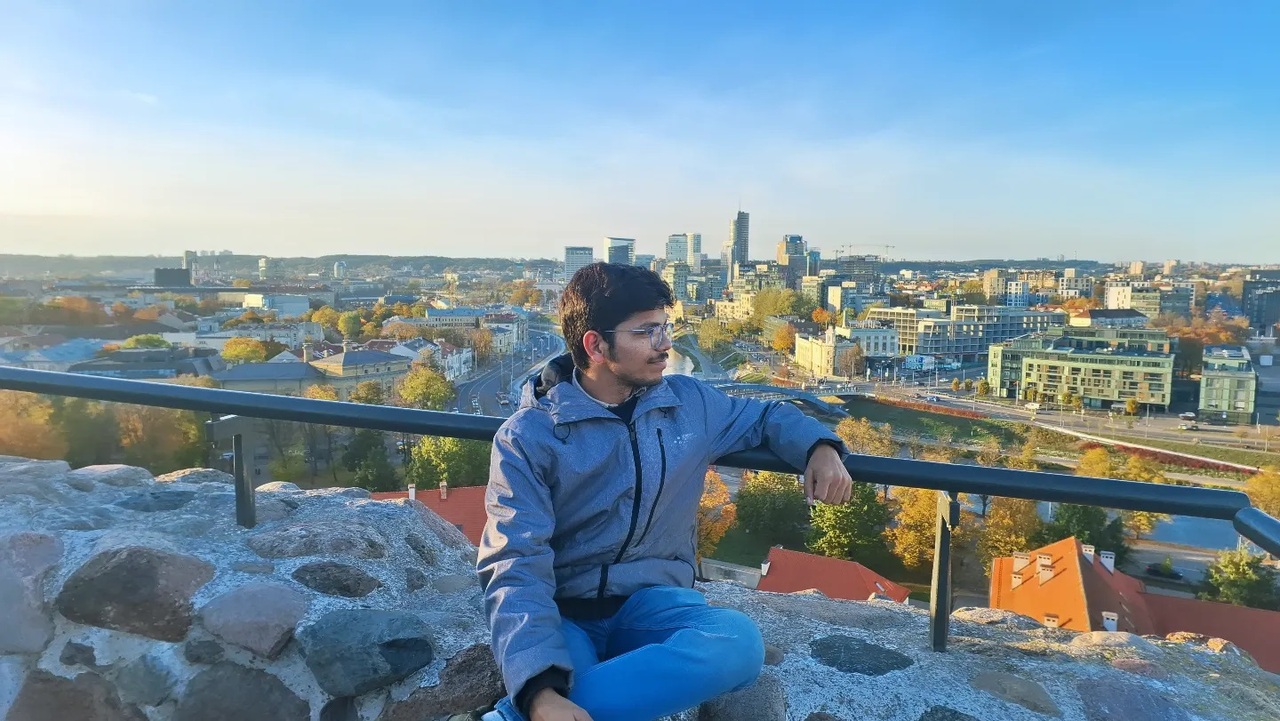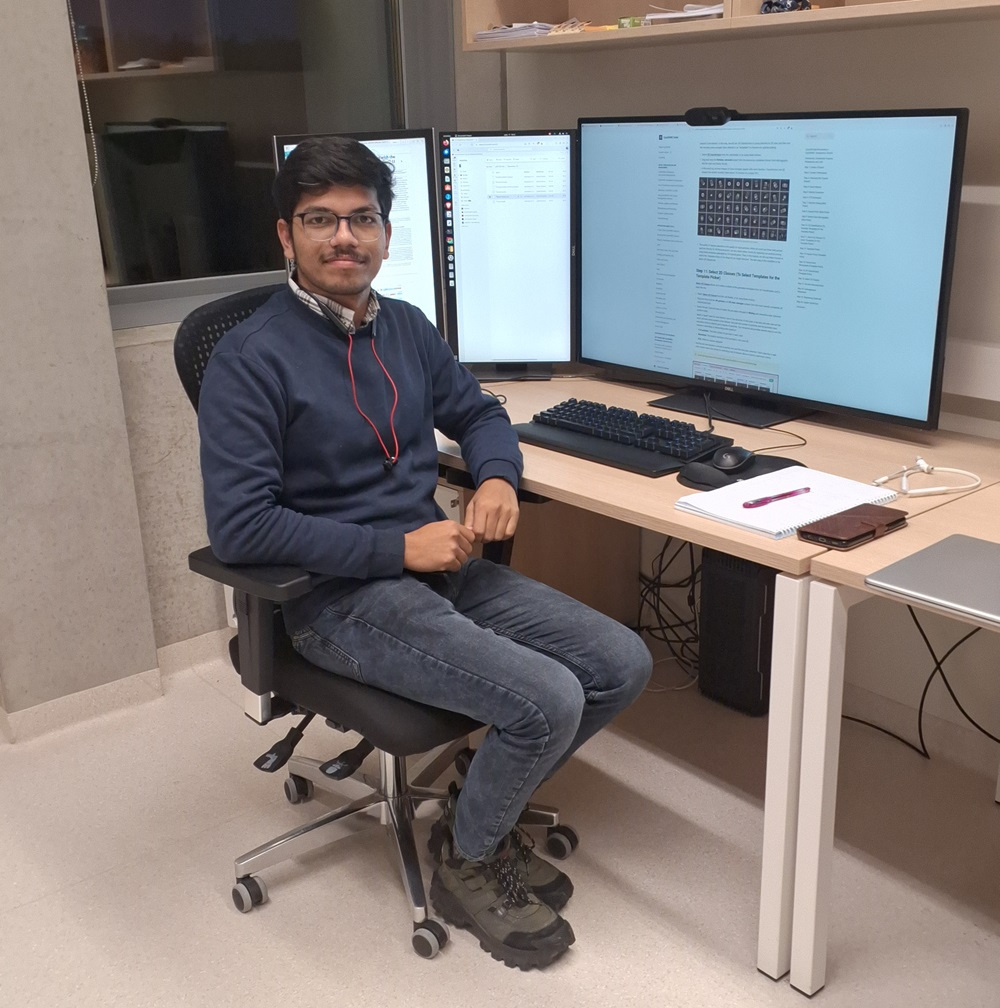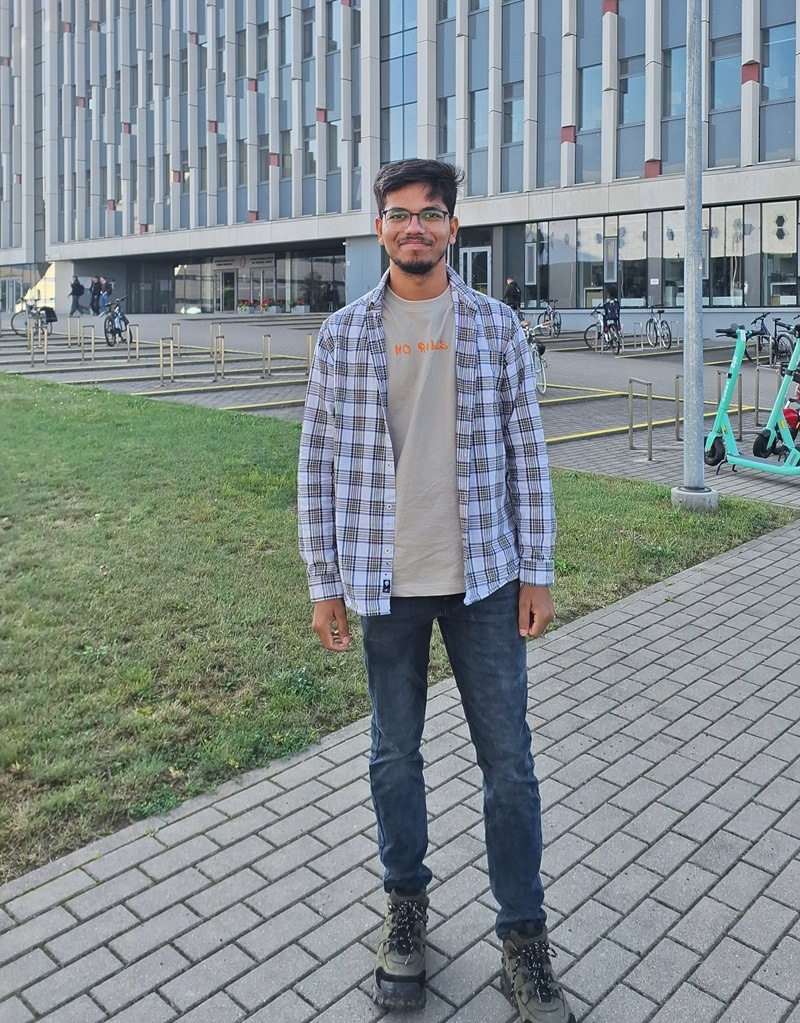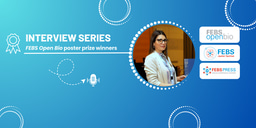A FEBS Summer Fellowship in Lithuania

I am Bablu Kumar, currently pursuing my PhD in Systems Medicine at the European School of Molecular Medicine (SEMM), which is a collaboration between the University of Milan and the University of Bari in Italy. Recently, I was awarded the 2024 FEBS Summer Fellowship to do research at the Life Science Center (LSC) of Vilnius University, Lithuania. There I am working with Dr. Darius Kazlauskas’s group in the laboratory of Dr. Česlovas Venclovas, a well-known expert in bioinformatics and CRISPR-Cas research. Their laboratory is currently working on developing various computational pipelines and tools to determine the origins and evolution of CRISPR-Cas proteins and analyze them by employing advanced Artificial Intelligence (AI) techniques like Protein language models.
Ongoing PhD project and Internship
My PhD research mainly focuses on developing machine learning models to predict how the gut microbiome affects human health. The gut microbiome consists of all the microorganisms, such as bacteria and viruses, that live inside our digestive systems. These tiny organisms play a huge role in our overall health. However, much of this world is still unknown, and there are many microorganisms that scientists have not yet discovered or fully understood. This is where my research comes in.
My research project at Vilnius University in Lithuania focuses on using deep learning and AI models to identify CRISPR-Cas arrays, which are related to the CRISPR gene-editing technology. CRISPR-Cas systems are found in bacteria, and they play a key role in defending them against viruses. By studying these systems, we can better understand their role in diseases and even find ways to use them to treat certain conditions.
Reason for internship
In recent years, technologies like AI and machine learning have advanced rapidly. Tools like Large Language Models (LLMs) and GPT, which you may know as tools used for natural language processing, have the potential to help us understand these unknown microorganisms. These technologies can process large-scale data and spot patterns that would be impossible for a human to identify. Keeping this in mind, I am considering incorporating such technologies into my PhD project to enhance its scope. This is why I decided to do an internship and I am excited to use these technologies in my research to uncover new findings about the gut microbiome.
Support from supervisor
As a PhD student, I believe that having your supervisor’s support is crucial for making any decisions, including those about internships. When I discussed my research idea and proposal, my supervisor, Professor Graziano Pesole, and co-supervisor, Dr. Bruno Fosso, were extremely supportive. I remember the first time I shared my intention to apply for the FEBS Summer Fellowship to work in an international lab. They encouraged me wholeheartedly and motivated me to pursue this opportunity. Their belief in my research ideas greatly boosted my confidence and inspired me to apply.
How I found the Fellowship?
I was searching for an internship that would allow me to work on LLM models and AI technologies in the field of microbiome research. However, finding the right internship to develop these skills further was not easy. The problem was that I didn’t have enough funds to support this research on my own. Fortunately, I found out about the FEBS Summer Fellowship through my PhD organization, SEMM. When I came across the fellowship, I saw it as an opportunity to gain the support I needed. The Federation of European Biochemical Societies (FEBS) is a well-respected organization that offers fellowships to young scientists who want to do research in life sciences. The fellowship not only provides financial support but also offers the chance to work in advanced laboratories.
Connecting with hosting lab supervisor Dr. Darius Kazlauskas
I first came to know about Dr. Darius Kazlauskas through Twitter (now X) in April 2022. He is doing extensive research on CRISPR-Cas systems and using AI techniques to understand them better. Their lab work fascinated me, so in February 2024, I decided to send him an email. I shared my ideas with him and expressed my interest in working in his lab. To my surprise and excitement, he responded positively. Not only did he agree to support my application for the FEBS Fellowship, but he also appreciated my project ideas. In my virtual meeting with Dr. Darius, he was very encouraging. He understood the direction I wanted to take with my research and was happy to help me achieve my goals. His support made a big difference in my journey.
Suggestion for students applying for fellowships
The application process for any fellowship can be challenging, especially if it's your first time applying. In my case, the journey felt particularly difficult as it was my first time applying for a fellowship during my PhD. However, based on my experience, I’d like to share a few simple tips that might help you if you're thinking about applying for a research fellowship or internship.
1.Find the right Fellowship
Look for organizations that offer fellowship opportunities aligned with your area of interest. In my case, it was FEBS that provided fellowship support to students. Each fellowship program may have different eligibility requirements, so it's important to select one that matches both your academic goals and financial needs. Make sure to thoroughly read the guidelines to ensure it’s the right fit for you.
2. Choose the lab
3. Proposal writing tips
Additionally, I would like to draw your attention to the fact that there are many general tips available in the public domain for writing a research proposal, but based on my experience, I would like to suggest some unique insights that will make your proposal stand out and convey the significance of the work effectively. For instance, explain how the hosting lab will help you reach your goals, mentioning any specific facilities or experts available in the group. Highlight the potential impact of your work, explaining how learning new skills will contribute to your PhD project and why you want to use it. By focusing on these key points, you can create a proposal that is clear and compelling for reviewers.
4. Tips for non-native English speakers
After I received a supporting email from Dr. Darius, the next big challenge was writing the research proposal. I began by drafting my proposal, and then I asked Dr. Darius for his feedback. Since I come from a non-English-speaking country, India, I sometimes struggle to express my ideas clearly in English. I often know what I want to say, but it can be difficult to put it into the right words. This is especially important when writing a research proposal, where choosing the correct words is essential.
Dr. Darius gave me a very useful tip: start by writing your ideas in your mother language. Then, use a tool like Google Translate to translate it into English and see if it accurately conveys what you intended to say. I applied this method when writing my entire research proposal, and it really helped me explain my ideas more clearly and concisely. I understand this may seem like very basic information, but I believe it could be helpful for students who find it difficult to express their ideas in English, especially when it comes to grammar or word choice.
Vilnius city
Vilnius, the capital of Lithuania, is a beautiful city. It is a unique place where history and modernity meet. The city has many historic buildings, and every corner seems to have a story to tell. I enjoy walking around the city and experiencing its peaceful atmosphere. Apart from its beauty, Vilnius is a city full of culture and diversity. The food here is amazing, and I have enjoyed trying local dishes. The people are also very friendly, and as an international student, I have found it easy to communicate because most people speak English very well. I have also found the people in Vilnius to be very polite and welcoming. As an international student, I am always meeting new people and improving my communication skills by speaking with them. The entire experience, both in and out of the lab, has contributed to my personal and professional growth.
Working at the Life Science Center
The Bioinformatics Department at Vilnius University’s Life Science Center has been a great place to work. The professors and students here are very professional, but they are also very friendly and helpful. The atmosphere is collaborative, and I feel like I have learned a lot in a short amount of time. It’s hard to describe how positive my first impression of the lab was, but it was one of the best experiences of my academic career.
What’s next for me?
In conclusion, this journey has been an incredible opportunity that I will cherish forever. I am deeply grateful for the unwavering support from Dr. Darius, Prof. Graziano Pesole, Dr. Bruno Fosso and my wonderful friends Jyotika Pachauri and Erika Lorusso, which I’ve received along the way. For anyone thinking about applying for a fellowship or internship, I encourage you to take the leap, seek advice, and believe in your ideas.


Top image of Bablu Kumar in Vilnius. All images by Bablu Kumar.





Join the FEBS Network today
Joining the FEBS Network’s molecular life sciences community enables you to access special content on the site, present your profile, 'follow' contributors, 'comment' on and 'like' content, post your own content, and set up a tailored email digest for updates.